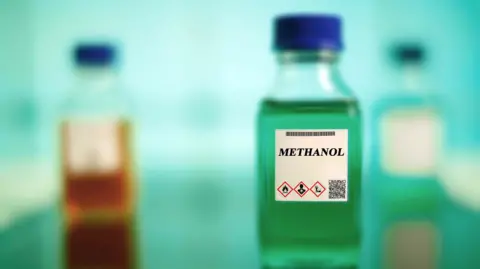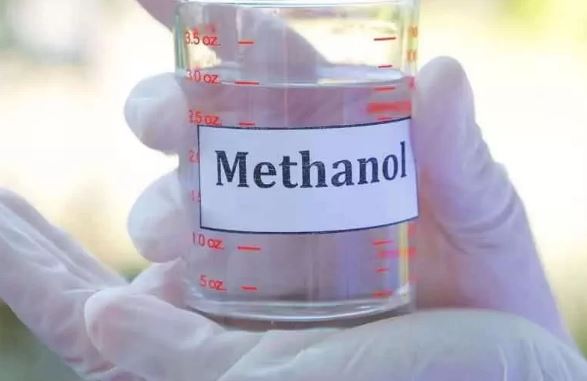Travellers are being warned of the dangers of methanol poisoning after six tourists to Laos have died.
Methanol is an industrial chemical found in antifreeze and windshield washer fluid.
It's not meant for human consumption and is highly toxic.
Drinking even small amounts can be damaging. A few shots of bootleg spirit containing it can be lethal.
What does methanol do to you?
It looks and tastes like alcohol, and the first effects are similar—it can make you feel intoxicated and sick.
Initially, people might not realise anything is wrong.
The harm happens hours later as the body attempts to clear it from the body by breaking it down in the liver.
This metabolism creates toxic by-products called formaldehyde, formate, and formic acid.
These build up, attacking nerves and organs, which can lead to blindness, coma and death.
Dr Christopher Morris, a senior lecturer at Newcastle University, said: "Formate, which is the main toxin produced, acts in a similar way to cyanide and stops energy production in cells, and the brain seems to be very vulnerable to this.
"This leads to certain parts of the brain being damaged. The eyes are also directly affected and this can cause blindness which is found in many people exposed to high levels of methanol."
Of the victims so far, five of the six have been women.
Toxicity from methanol is related to the dose you get and how your body handles it.
As with alcohol, the less you weigh, the more you can be affected by a given amount.
Dr Knut Erik Hovda from Médecins Sans Frontières (MSF), which tracks methanol poisonings, says awareness varies a lot among tourists and healthcare staff in different parts of the world - and that could mean delays in diagnosing it.
"The symptoms are often so vague until you get really sick," he told the BBC.
How is methanol poisoning treated?
Poisoning is a medical emergency and should be treated in hospital.
There are drug treatments that can be given, as well as dialysis to clean the blood.
Some cases can be treated using alcohol (ethanol) to outcompete the methanol metabolism. But this has to be done quickly.
Prof Alastair Hay, an expert in environmental toxicology from the University of Leeds, explained: "Ethanol acts as a competitive inhibitor largely preventing methanol breakdown, but markedly slowing it down, allowing the body to vent methanol from the lungs and some through the kidneys, and a little through sweat.”
Dr Hovda said getting help quickly after consuming methanol was crucial to chances of surviving.
"You can ease all affects if you get to hospital early enough and that hospital has the treatment needed," he said.
"You can die from a very small proportion of methanol and you can survive from a quite substantial one, if you get to help.
"The most important antidote is regular alcohol."

How can travellers avoid methanol poisoning?
MSF says the majority of methanol poisonings happen in Asia, but some also occur in Africa and Latin America.
The advice for travellers is to know what you’re drinking and be aware of the risks.
Drink from reputable, licensed premises and avoid home-brewed drinks or bootleg spirits.
Methanol is produced during the brewing process and concentrated by distillation.
Commercial manufacturers will reduce it to levels which are safe for human consumption. However, unscrupulous backyard brewers or others in the supply chain may sometimes add industrially produced methanol to make it go further and increase profits.
Dr Hovda said methanol was mixed into alcohol "mostly for profit reasons, because it's cheaper and easily available".
It is also possible for high levels of methanol to be produced by contaminating microbes during traditional ethanol fermentation.
The UK Foreign Office advises travellers: "Take care if offered, particularly for free, or when buying spirit-based drinks. If labels, smell or taste seem wrong then do not drink."
Which drinks could contain methanol?
Affected drinks may include:
- local spirits, including local rice or palm liquor
- spirit-based mixed drinks, such as cocktails
- counterfeit brand-name bottled alcohol in shops or behind the bar
To protect yourself from methanol poisoning:
- buy alcoholic beverages only from licensed liquor stores
- buy drinks only at licensed bars and hotels
- avoid home-made alcoholic drinks
- check bottle seals are intact
- check labels for poor print quality or incorrect spelling
Seek urgent medical attention if you or someone you are travelling with show signs of methanol poisoning.


